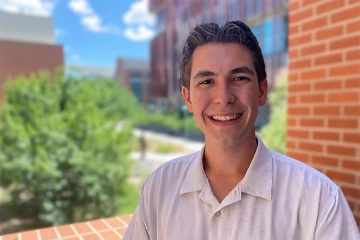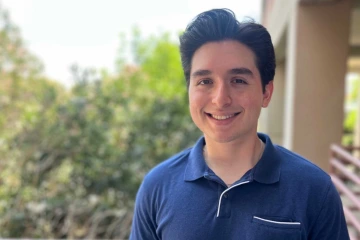White Coat Ceremony marks first step for next generation of physicians
- What: White Coat Ceremony for Class of 2029 at the University of Arizona College of Medicine – Tucson
- When: Friday, July 25, 5:30-7:30 p.m.
- Where: University of Arizona Centennial Hall, 1020 E. University Blvd., and livestreamed on YouTube: https://youtube.com/live/wejGGsxPT6Q?feature=share
This week, 120 University of Arizona College of Medicine – Tucson students will take part in the annual White Coat Ceremony that serves as a welcome for the Class of 2029. The ceremony will be held July 25 at Centennial Hall from 5:30 to 7:30 p.m. The event recognizes medical students’ entry into medicine with their first physician’s white coats, the garment of their future profession.

Airen Fortunato, a first-generation college graduate who earned a bachelor’s degree in neuroscience and cognitive science from the U of A, fell in love with medicine while enrolled in a College of Medicine – Phoenix program in high school.
Photo by Angela Maria Martinez, College of Medicine - Tucson
“The white coat symbolizes our students’ commitment to the highest standards of the medical profession and the responsibilities that come with the study and practice of medicine,” said Kevin Moynahan, MD, the college’s vice dean for medical education and a professor of medicine. “The White Coat Ceremony is one of my favorite events of the year, and the positivity and excitement keep me energized as the Class of 2029 starts medical school.”
The ceremony is considered a rite of passage in most U.S. medical schools. The Arnold P. Gold Foundation established the first white coat ceremony in 1993 at Columbia University in New York. The first University of Arizona College of Medicine – Tucson white coat event was held in 1995, and it has been a tradition for incoming medical students since.
Guest Speaker
The featured speaker for this year’s event is Lisa M. Rimsza, MD, chair of the College of Medicine – Tucson’s Department of Pathology and Laboratory Medicine. Rimsza, a nationally recognized expert in lymphoma biology, is a triple alumna of the University of Arizona. She earned her bachelor’s degree in pharmacy from what is now the R. Ken Coit College of Pharmacy, followed by both her medical degree and pathology residency at the College of Medicine – Tucson. She worked at the Mayo Clinic Arizona before returning to the U of A last year.
Class of 2029
The Class of 2029 is 58% women and 42% men, with an average age of 24. Of the 120 students, 86 are from Arizona, 16% are first-generation college students and 19% had a rural upbringing. Below are a few of the students who will be participating in Friday’s event.
Airen Fortunato: ‘I immediately fell in love’
First-generation college graduate Airen Fortunato’s path to medicine began as a teenager, when he enrolled in the College of Medicine – Phoenix’s Saturday Scrubs program.

Minnesota native and former Division I women’s basketball player Maya Nnaji is taking advantage of the Accelerated Pathway to Medical Education program, which transitions students from three years of undergraduate science coursework directly into medical school.
Photo courtesy of Maya Nnaji
“I immediately fell in love,” he recalled.
The experience inspired him to continue exploring medicine in college. He subsequently participated in two other medicine-related programs.
“The Research Associates Program gave me a deep insight into medicine – it’s a lot less glamorous than TV,” he said. “Then, with FRONTERA, we went out into the community and did shifts with the Mobile Health Unit.”
Fortunato applied to the Honors Early Assurance Program, which provides early medical school admission to academically talented University of Arizona juniors.
“I’m thankful I applied, not only to have the reassurance that I’m in, but also the community aspect of having nine other people I already know entering medical school. I’m not going into this completely blind.”
Now, armed with a degree in neuroscience and cognitive science, he’s ready to take his first step into medical school — and is already leaning toward family medicine.
“I can increase access to care in the midst of our primary care provider shortage,” he said. “I want to go into rural health and give back to those communities and support people like me.”
Maya Nnaji: ‘What fuels me every day’
Known nationally for her standout career as a Division I women’s basketball player, Maya Nnaji is now stepping into a different kind of spotlight and trading her role as a forward on the court for a future as a provider on the frontlines of patient care.
As a high school senior in Minnesota, Nnaji was accepted into the Accelerated Pathway to Medical Education, or APME, program, which transitions students from three years of focused undergraduate science coursework directly into medical school.
“It was one of the most exciting moments of my life,” she said. “Being part of APME has been the highlight of my time at Arizona – the people, the staff, the early exposure to medicine – it’s been incredible.”
Growing up as a Nigerian American, Nnaji witnessed the impact of limited access to health care in her extended family and community.
“I’ve lost family to treatable conditions. That doesn’t sit right with me, and it’s what fuels me every day.”
Above all, Nnaji hopes to become the kind of physician patients can trust.
“In a world where many feel overlooked or unheard, I want to be a reminder that they matter. My goal is to have a global impact and hopefully inspire others to do the same.”

Surprise, AZ-native and U of A College of Science graduate John Zuckerman is committing to remain in Tucson for another nine years as a participant of the three-year medical degree program Primary Care Accelerated Medical Pathway.
Photo by Angela Maria Martinez, U of A College of Medicine - Tucson
John Zuckerman: ‘I hope my career will always be centered around altruism’
Hailing from Surprise, a Phoenix suburb, John Zuckerman came to Tucson to earn his bachelor’s degree in biology from the College of Science. He set down roots, playing bass in a band and gaining experience in clinics and emergency departments.
“Those interactions with patients solidified that this was something I’m passionate about,” Zuckerman said.
He is now committing to remain in Tucson for another nine years as a participant of the three-year medical degree program Primary Care Accelerated Medical Pathway, or PCAMP, the college’s latest effort to address the primary care provider shortage.
“Working in a clinic that primarily treated underserved folks, the shortage was palpable – people were struggling,” he said. “Taking initiative to address the physician shortage in Arizona is something I really want to do with my life.”
The program consists of three years of medical school and a three-year family medicine residency program, followed by three years as a faculty member training medical students.
“I developed my passion for family medicine working as a family medicine medical assistant for the past three years,” Zuckerman said. “I hope my career will always be centered around altruism, continuously bridging gaps in health care access and using my skills to give back to communities in need.”
Ross Dubois
U of A College of Medicine – Tucson
520-626-9037, duboisr@arizona.edu

